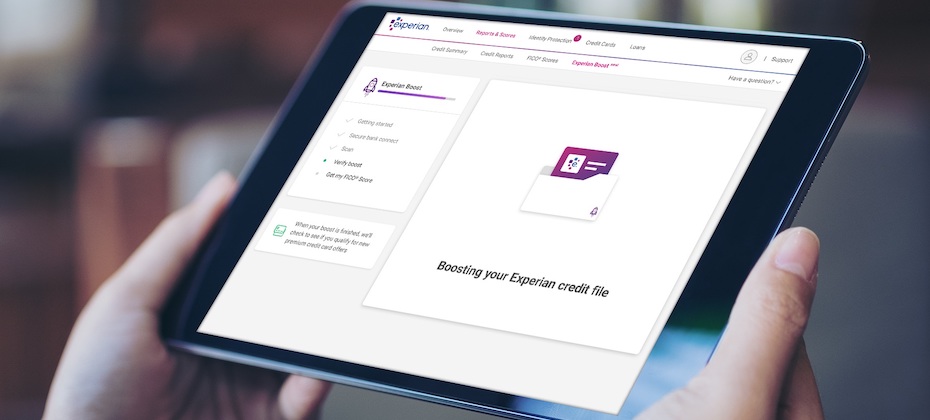World
News about Experian from all over the globe:

A little more than a year removed from the beginning of the pandemic, and we’re still seeing many of the most vulnerable and underserved communities struggling to find a stable financial foothold. These are consumers with little to no credit history and are often underrepresented in the network of bank branches and sometimes less familiar with what’s available to them in the consumer credit system. The pandemic has taken a toll on the fabric of our financial ecosystem, and we need to help these consumers get back on their feet. That’s one of the reasons we’ve partnered with the 100 Black Men of Greater Washington, D.C. Together, we’re launching a broad financial health initiative to assist multiple African American communities suffering COVID-19-related hardship. But the partnership is just one of the ways Experian is assisting marginalized and underserved communities. Addressing Financial Inclusion Experian is deeply committed to helping marginalized and low-income communities access the financial resources they need to live. That’s why we’re working to ensure we find ways to help underserved consumers gain access to fair and affordable credit by assisting them in building their credit profiles. We view ourselves as “The Consumers’ Bureau,” and it’s our commensurate responsibility to do everything we can to drive financial inclusion. We are working side-by-side with lenders, credit scoring companies and consumers to eliminate credit invisibility and improve financial equity. Our teams at Experian, diverse as they are, feel passionate about this very important mission. We understand that a big part of the solution relies on bringing new sources of data into our credit files, so that credit scores reflect all of a consumers’ relevant financial behavior. We strongly believe that these new sources of data will augment and thereby enhance our current credit data as an effective means for lenders’ assessment of a consumer’s financial situation. There’s a percentage of the population—on average, it’s 17% of Americans, measured by FICO—who are excluded from the credit economy because they simply lack a credit history. To that end, we’ve been a pioneer in using rental, utilities and telecom payment data to help broaden credit access for consumers. Boosting 6 Million In fact, more than two years ago, we created Experian Boost, which was a first-of-its-kind service designed to help consumers instantly improve their FICO® Score by giving them credit for on-time utility, telecom and streaming service payments. All of those elements are conceived to be part of people’s credit scores, however utility and cell phone providers have not collaborated to report their data to all credit bureaus. With Experian Boost, we empower consumers to report the data themselves, and more importantly, 70% of consumers benefit from doing so, seeing an uplift in their credit score. And to date, more than 6 million consumers have used Experian Boost with over 50 million cumulative points added to FICO Scores across the US. Our Commitment to Financial Health But our commitment doesn’t end there. Consumer credit education and best practices are key to setting marginalized consumers up for financial success. Through Experian’s United for Financial Health initiative—we’re empowering vulnerable people and communities to improve their financial wellbeing through that very belief. In addition to our partnership with the 100 Black Men of Greater Washington, D.C., we’re working closely with Operation HOPE, Black Girl Ventures, and NAACP Empowerment Programs, to help disenfranchised groups improve their credit standing, provide entrepreneurial education for Black and Brown women entrepreneurs, and offer grants to help homeowners at risk of losing their homes In addition to our consumer credit education initiatives with our partners, we continually push credit education materials and programming through our own social media channels and community outreach efforts. In honor of Financial Literacy Month, we’re hosting a #CreditChat on Wednesday, April 28 at 3 p.m. ET, entitled, Closing the Financial Literacy Gap in Underserved Communities. We believe helping underserved communities better understand the credit ecosystem and equipping them with the tools and knowledge to improve their credit standing, are mission critical to a healthier financial life. And we’re hopeful this #CreditChat discussion is another step forward in that journey. We won’t rest until the job’s done. We’ll continue to innovate and find new ways to use data in the credit scoring process, and work arm-in-arm with consumers and lenders to improve financial access. Through our investments in data and advanced analytics, we’ll continue to help lenders identify consumers who are excluded from the credit ecosystem, but who can fulfill their financial obligations and pay responsibly. We want to empower consumers to take control of their financial lives, and will continue to take strides to do so.

During a year of the pivot, Experian North America remained focused on our purpose: Creating a Better Tomorrow. It’s not just a marketing tag line. It’s the lens through which we care for our employees, and how they in turn fuel innovations to serve our communities when they need help the most. That’s why this year’s 31 ranking in the Fortune "100 Best Companies to Work For" is so incredibly meaningful. For this year’s national award, two elements were considered: confidential employee feedback and the programs companies created to support people and communities in response to COVID-19. The employee surveys were distributed last summer, in the thick of pandemic restrictions and lockdowns. All around, we saw improvement: 50 percent of employees responded to the surveys (compared to 43 percent the year before), and 92 percent of employees attest that Experian is a Great Company to Work For (compared to 86 percent the year before). We’ve worked hard to build an employee culture over the past several years that continuously strives for inclusion and equity. This foundation became instrumental to how we navigated the past twelve months. Our employee resource groups took the lead to support our colleagues with the creation of a dynamic mental health and well-being guide, producing programs that brought awareness and support during social unrest and the rise in racism, and arranging annual celebrations to provide a touch of “normalcy.” Through a year that also included natural disasters such as the arctic blast, wildfires, storms and flooding, we have been there for each other. From free credit reports for consumers and small businesses, to products and services that enable governments, healthcare providers and nonprofits to prepare for and serve populations in crisis, Experian North America’s workforce leveraged diversity of perspectives, backgrounds and experiences to help vulnerable populations in crisis from COVID-19. Even through lockdowns and restrictions, employees logged 18,000 volunteer hours to increase financial inclusivity, support frontline healthcare workers, honor the nation’s military and veterans, and fight hunger. The Human Rights Campaign Foundation gave Experian North America a perfect score in its Corporate Equality Index for the third year in a row, and the company earned its recertification as a Great Place to Work. It has been named one of the top 10 Fortune’s Best Workplaces in Financial Services and Insurance, and a Comparably Top 50 company for Best Outlook 2021. Experian Costa Rica, part of our North America region, also earned Great Place to Work honors for the third year in a row. Our purpose runs deep. We put our people at the heart of how we run our business and it guides how we serve our consumers, clients and each other. We will continue this momentum of the 2021 Fortune 100 Best Companies to Work For by helping to drive financial inclusion and equity, growing our business through innovation, and creating opportunities for our coworkers to thrive and build meaningful careers.

After launching Experian Boost, the first-of-its-kind tool that allows consumers to instantly increase their credit scores, in March 2019 we recently reached a significant milestone. Millions of consumers have boosted their credit scores to the tune of 50 million total points. This means many consumers have improved score bands, saved money with better interest rates, and maybe reached some of their financial goals such as gaining access to credit for a home. In fact, we know our Boost users have gained access to more than 1.7 billion total dollars in credit as a result of improving their credit score. The idea behind Experian Boost is to give consumers control over their credit – to enable them to make real, substantial progress in their financial health journey by getting “credit” for paying bills on time. Our ability to help consumers in a challenging economic climate is what drives us to continue to innovate. For example, we recently expanded Experian Boost to add positive payment history for video streaming services such as Netflix in addition to telecom and utility payments. The benefits to having control and using tools like Experian Boost do not end there. Consumers receive a boosted FICO® Score, which is used by a majority of lenders giving them a great opportunity for credit with better terms. In the first year after launching, we saw one million consumers add a credit card and nearly 250,000 consumers acquired an auto loan. Also, some consumers earned a credit score for the first time. What is also significant about Experian Boost is that this type of financial control and opportunity gives consumers a sense of empowerment, motivation and satisfaction that they can take a positive step in their financial journey. We’ve heard this firsthand from consumers through focus groups, and we even featured some consumers in our commercials who shared their positive experiences in front of the camera. This sentiment of empowerment among consumers is especially important right now as many are struggling financially due to the pandemic. We have many exciting new tools launching in 2021 and will continue to focus on empowering consumers to reach their financial goals. To learn more about Experian Boost, visit www.experian.com/boost.

Does checking my credit report hurt my credit score? How can I improve my credit score? What’s the difference between a credit score and a credit report? These are a few of the questions I most often hear about credit, and the answers to these fundamental questions are essential to financial well-being. Understanding credit scores and the factors that influence overall credit health is important any time, but this is especially true in our current environment. As part of our ongoing commitment to consumer education on the road to recovery, I recently had the pleasure of partnering with Akbar Gbajabiamila, host of American Ninja Warrior, former football pro and financial fitness expert, for an Instagram Live event. Akbar is passionate about helping people develop a financial game plan and he understands having a good credit history is a key component of good financial health. During the Instagram Live event, I answered questions from Akbar’s fans and shared ways to improve your credit score through tools like Experian Boost. In case you missed it, you can watch the video recap on Akbar’s Instagram account (@akbar_gbaja) or at the following link: https://www.instagram.com/tv/CLpbdDJlaQ6/ View this post on Instagram A post shared by 🇳🇬Akbar Gbajabiamila🇺🇸 (@akbar_gbaja) A positive credit history can be the gatekeeper to many of the things we all want in life, and we’re committed to helping facilitate fair and affordable access to credit for all consumers, including those in marginalized communities. This is one of the many reasons I’m passionate about my role at Experian. Educating consumers about credit is an important part of getting the economy as a whole humming again and helping those most in need. If you have additional questions about credit, feel free to check out the free resources below. Additional credit education resources and tools Join Experian’s weekly#CreditChat hosted by @Experian on Twitter with financial experts every Wednesday at 3 p.m. Eastern time. Visit the Ask Experian blog for answers to common questions, advice and education about credit. Add positive telecom, utility and streaming service payments to your Experian credit report for an opportunity to improve your credit scores by visiting experian.com/boost. You can request a free copy of your credit report from each of the three credit bureaus once a week through April 20, 2022 by visiting annualcreditreport.com For additional resources, visit https://www.experian.com/consumereducationor experian.com/coronavirus.

We recognize that COVID-19 has challenged Americans across the country, and nearly a year later, people are still struggling to recover. Among the more pressing issues for people has been navigating the financial landscape and hardships brought on by illness and high unemployment rates. At Experian, we empathize with consumers and are committed to helping them manage their financial lives. As part of this commitment, Experian, along with the other U.S. credit reporting agencies, is continuing to offer free weekly credit reports to all Americans for an additional year via AnnualCreditReport.com. At Experian, we view ourselves as the consumers’ bureau, and aim to help people better position themselves as they recover from COVID-related hardships. We’re proud of our ongoing efforts to assist consumers, particularly during these difficult times. Financial and credit information is constantly updated, and we believe providing consumers with increased access to their credit reports will help them improve their financial health, monitor for lender updates and ensure there is no fraudulent or unfamiliar activity on their credit profiles. We are committed to helping facilitate access to fair and affordable access to credit for all consumers. Our goal is not only to help consumers build credit, but also to effectively manage it. Beyond our continued offering of free credit reports, consumers can access resources and educational materials to help learn about credit and other important personal finance topics. In fact, we recently launched our United for Financial Health project to empower vulnerable populations to improve their financial health through education and action. We’re continually exploring new ways to use our data and resources to empower consumers and to improve their financial health and recover from COVID-19; extending access to free weekly credit reports is just another step in that process.

A year ago, we shifted our business to remote working as the global pandemic took hold. Like the rest of the world, we had no idea how long we’d be away, but we didn’t really imagine we’d still be operating our business with a remote workforce a year later. What a year it has been. It is incredible to look back and reflect on how our lives have changed, how we were able to adapt to this new way of living and working, and really importantly, how we were able to keep innovating to help communities and businesses during this difficult time. We have captured highlights of our work and efforts in our North America annual diversity and inclusion report, 2020 Power of YOU. At Experian, the safety and well-being of our colleagues has consistently been a top priority. As such, we have been able to focus on serving consumers and clients when and where they need help the most. As a company, we expanded our benefits to take care of our employees. Coworkers jumped in to take care of each other. Our employee resource group dedicated to mental health and caregiving partnered with colleagues to create a dynamic set of tools and guides tackling different topics every week through webinars, articles and personal, candid videos from leaders. We supported each other during times of social unrest. We celebrated progress in growing our business. We logged 18,000 volunteer hours to increase financial inclusion, support frontline healthcare workers, honor active duty military and veterans, and fight hunger in underprivileged communities. We leveraged our diversity of perspectives, backgrounds and experiences to help vulnerable populations in crisis from COVID-19, including launching our United for Financial Health program. We remain steadfast and committed to equity for all. We are proud to start the new year with this wonderful look back at last year, propelling us forward to more opportunities to innovate and serve. We invite you to check out the 2020 Power of YOU Report here.

Given the many challenges presented over the last 12 months, it’s extremely satisfying to have retained our status and I couldn’t be prouder of this achievement. Being certified as a Top Employer showcases our dedication to a better world of work, which has been exhibited through our excellent HR policies and people practices. It’s been a year like no other, and the COVID-19 pandemic, in particular, has been a real test of our business resilience. Hugely challenging for many individuals. I’m really proud of the support we have put in place, helping our people to reach their full potential and remaining true to our values and purpose. We have been determined to ensure that the diverse needs within our workforce are accommodated. Our ability to exercise progressive policies, such as greater flexibility and enhanced wellbeing offerings, has been essential for our people to adapt to a very different way of working successfully. We’ve provided a wide range of resources, including employee assistance programmes, mindfulness training and collaborative technology tooling, to ensure that our people have the relevant support to stay mentally well. But it is our people that have made this recognition possible. Despite our new working environments, they have been instrumental in ensuring our culture continues to thrive. I have heard so many great examples of how teams stay connected and support each other – from video walks and online games to competitions and virtual cocktail hours. This award demonstrates that we are clearly on the right path, but we won’t stop here. We’re always looking for new ways to do things and to improve as a business. By listening to our people and actively encouraging new ideas, we can continue to develop Experian as a great place to work. To find out more about the Top Employer certification, click here.

Digital identity solutions are a crucial component to enhancing the customer experience in digital transactions. Driven by verified data, digital identity as a concept benefits both businesses and consumers. Innovative and effective solutions can prevent costly fraudulent activity and enhance compliance measures for businesses and ensure a more convenient and protected experience for consumers. Consumer preference for digital transactions has grown exponentially and will continue to do so leading to higher customer expectations for a seamless and secure experience. Experian is deeply committed to developing leading solutions and has earned high rankings in industry experience, strength of product and seamless solutions in Juniper Research’s Digital Identity: Technology Evolution, Regulatory Landscape & Forecasts 2020-2025 Report. Juniper Research, one of the leading global analyst firms in the mobile and digital technology sector, evaluated vendors active in the digital identity space based on factors such as size, financial performance, global reach, product range, number of clients and strength of partnerships. Juniper provides the most comprehensive and progressive analysis of the digital commerce market in its market-leading Commerce & Fintech research. The report discusses new approaches in the identity space and highlights best practice recommendations for deployment, in which Experian continues to be a market leader and remains committed to the crucial nature of identity as a concept for businesses. Experian’s proprietary solutions and digital identity services are available through Experian’s CrossCore partner ecosystem, which combines advanced analytics, rich data assets, identity insights and fraud prevention capabilities. Businesses using the Experian CrossCore partner ecosystem can connect any new or existing tools and systems in one place to quickly adjust strategies based on evolving threats and business needs, which helps to improve efficiency and reduce operational costs.

We’re currently living in a period of uncertainty in the UK and it can be quite difficult for people to understand how best to set up their finances for any economic turbulence ahead. We are all looking for the financial knowledge, confidence and resilience that can help us absorb any unforeseen circumstances. However, for some people, it’s not that easy. Many simply don’t have the literacy skills to be confident in managing their finances. Being able to read and make sense of, for example, a credit report, bank statement or letter from a bank is an essential part of this. But a lack of understanding could lead to financial difficulties and an inability to find the support to improve your situation. Experian’s ‘United for Financial Health’ programme was born out of the company’s desire to empower vulnerable people so they can improve their financial health through education and action – particularly those affected the most by the Covid-19 pandemic. This is why we’re excited to partner with National Literacy Trust, to help deliver a campaign called ‘Words that Count’. The campaign focuses on providing young people (16-24) in Manchester with skills and confidence in words, to improve their financial health. The campaign will enable young people to be more comfortable at making good financial decisions. Improving money confidence through literacy skills can also lead to better savings habits – putting them in a stronger position to meet their long-term financial goals like getting a car, a mobile phone contract or even a mortgage. Importantly, improving literacy can help those who are currently struggling as a result of the pandemic. Experian is immensely proud to support ‘Words that Count’. Young people deserve the opportunity to succeed and avoid the long-term problems associated with financial difficulty, such as unmanageable debt and poor mental health. This campaign can help give them a ‘literacy leg-up’, and we hope it will provide a successful template to help disadvantaged communities throughout the UK.